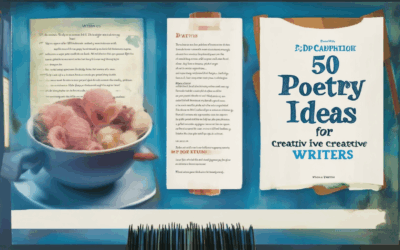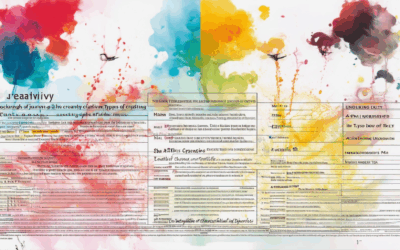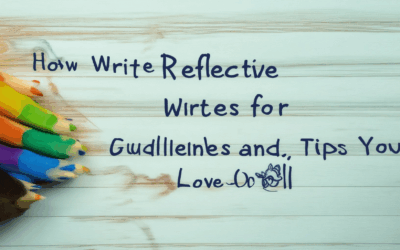Literature has the remarkable ability to transform ordinary reading into a profound experience, sparking introspection and fostering deeper connections with the text. For many, the act of literary reflection—a deliberate process of exploring and analyzing works—provides a powerful way to unpack meaning, uncover hidden insights, and enrich their understanding of the world around them. Whether you’re a student, a writer, or simply someone who enjoys delving into stories, mastering the art of literary reflection can unlock new dimensions of thought and expression. This guide offers a wealth of ideas, examples, and strategies to help you navigate the complexities of literary reflection, ensuring your exploration is both meaningful and impactful. From crafting thoughtful reflections to choosing the right topics, this article equips you with the tools to dive into the rich tapestry of literature and emerge with fresh perspectives and renewed appreciation for the written word.
Key Takeaways
- Clarity in Purpose Drives Effective Reflection: Understanding your goal ensures your reflection is focused and meaningful.
- Structure Guides Success: Organizing your reflection with clear sections enhances clarity and impact.
- Depth Reveals True Insight: Probing emotions and experiences leads to profound self-discovery.
- Audience Awareness Enhances Authenticity: Tailoring your reflection for others maintains formality while staying genuine.
- Balance Brings Growth: Acknowledging both triumphs and challenges fosters comprehensive development.
- Tone and Organization Keep It Engaging: A conversational yet structured tone makes reflections relatable and compelling.
- Embracing Vulnerability Unlocks New Insights: Openness to continuous growth enriches your reflective journey.
- Examples Show Reflection’s Variety: From personal journaling to mirror checks, reflection takes many forms.
- Thematic Topics Inspire Deep Exploration: Themes like personal growth and identity exploration provide rich material for reflection.
- Insights Illuminate Character and Decisions: Grappling with past choices reveals valuable life lessons.
- A Journey of Self-Discovery: Reflection is a continuous process that shapes who we are and who we become.

How to Write a Literary Reflection
A literary reflection is a thoughtful exploration of a text, allowing readers to engage deeply with the author’s ideas and themes. Here’s a structured approach to crafting an effective literary reflection:
Step 1: Choose Your Text
Select a literary work that resonates with you. Whether it’s a novel, poem, or essay, ensure it has layers of meaning and complexity to reflect upon.
Step 2: Read Thoroughly
Read the text carefully, paying attention to details, themes, and character development. Highlight key elements that stand out to you.
Step 3: Identify Central Themes
Pinpoint the primary themes of the work. Consider how these themes interconnect and contribute to the overall message of the text.
Step 4: Analyze Symbols and Imagery
Examine symbolic elements and imagery. Determine how they function within the narrative and what they reveal about the author’s intent.
Step 5: Explore Narrative Structure
Analyze the narrative structure, including tone, perspective, and pacing. How does the author present information and engage the reader?
Step 6: Connect to Broader Issues
Consider how the text relates to broader societal, cultural, or political issues. Link the work to contemporary debates or historical contexts.
Step 7: Reflect Personally
Draw parallels between the text and your own experiences or beliefs. Share personal insights that arise from your reading.
Step 8: Synthesize Your Thoughts
Combine your analysis and personal reflections into a cohesive argument. Ensure your reflection flows logically, supporting your thesis with evidence from the text.
Step 9: Edit and Revise
Review your draft for clarity, coherence, and depth. Refine your arguments and ensure your reflection offers unique insight into the text.
By following these steps, you can craft a literary reflection that is both analytical and personal, offering valuable perspectives on the text.
Examples of Reflection Topics
- Personal Growth and Self-Awareness
- Self-reflection on personal achievements and failures
- Exploring strengths and weaknesses
- Goal setting and tracking progress
- Educational Reflection
- Classroom learning experiences and outcomes
- Teacher training and professional development
- Student performance analysis and improvement strategies
- Literary and Creative Reflection
- Analysis of literary themes and characters
- Exploring narrative techniques and storytelling
- Creative process reflection and inspiration sources
- Professional Development
- Team dynamics and collaboration experiences
- Leadership style and decision-making processes
- Career path exploration and goal alignment
- Philosophical Reflection
- Exploring existential questions and meaning of life
- Ethical dilemmas and moral reasoning
- Historical events and societal evolution analysis
- Art and Creativity
- Aesthetic appreciation and artistic interpretation
- Creativity exercises and idea generation
- Inspiration sources and creative block solutions
- Broad Life Experiences
- Travel and cultural immersion reflections
- Relationship dynamics and communication patterns
- Spiritual growth and life purpose exploration
- Global and Social Issues
- Social justice movements and their impact
- Environmental sustainability challenges and solutions
- Globalization effects on local communities

What are the 5 R’s of reflection?
The 5R framework for reflection is a powerful tool for personal growth and self-awareness. It consists of five interconnected components that guide individuals through the process of reflecting on their experiences, emotions, and actions. Here’s a breakdown of each component:
- Reporting
- This involves documenting your thoughts, feelings, and observations. It’s about capturing the essence of your experience in a tangible way, whether through journaling, recording audio, or simply noting key moments. Effective reporting helps you retain details that might otherwise fade away.
- Responding
- After reporting, you move into responding to your own narrative. This means exploring your emotions and reactions to what has happened. It’s about questioning assumptions, acknowledging biases, and understanding the deeper meanings behind your experiences. Responding helps you connect with your authentic self.
- Relating
- Relating involves connecting your personal experience to broader contexts. This could mean drawing parallels with past events, cultural narratives, or universal themes. By relating, you gain perspective and often uncover patterns or lessons that resonate beyond your individual story.
- Reasoning
- Reasoning is about analyzing your thoughts and actions critically. It involves questioning cause and effect, considering alternative viewpoints, and seeking evidence to support your conclusions. This step enhances your ability to make informed decisions and fosters critical thinking skills.
- Reconstructing
- Finally, reconstructing allows you to synthesize your reflections into a coherent whole. This might involve creating a summary, identifying takeaways, or developing an action plan based on your insights. Reconstruction ensures that your reflection leads to meaningful growth and future application.
By systematically applying these five Rs—Reporting, Responding, Relating, Reasoning, and Reconstructing—you can develop a rich, introspective practice that enriches your life and enhances your personal development.

How to Write a Good Personal Reflection
Reflecting on your experiences is a valuable practice that allows for self-discovery and growth. Here’s a structured approach to crafting an effective personal reflection:
1. Understand Your Purpose
- Self-Reflection: Journal your daily experiences to gain insight into your emotions and thoughts.
- Professional Context: Reflect on events or decisions for a job or class, aiming for clarity and structure.
2. Structure Your Reflection
- Introduction: Briefly state the topic or event you’re reflecting on.
- Body Paragraphs: Discuss your thoughts, emotions, and experiences. Use specific anecdotes to illustrate your points.
- Conclusion: Summarize your reflections and any insights gained.
3. Focus on Depth and Specificity
- Delve into your emotions and ask yourself probing questions. Avoid vague statements like “I was upset” and instead describe the situation in detail.
4. Consider Your Audience
- If writing for others, ensure your reflection is clear and well-explained. Maintain a balance between formality and authenticity.
5. Balance Successes and Failures
- Acknowledge both positive outcomes and areas for growth. Learning from both successes and setbacks promotes personal development.
6. Maintain Tone and Organization
- Use a conversational yet organized tone to keep your reflection authentic and engaging. Avoid overly formal language.
7. Be Open to Growth
- Understand that reflections are a journey. Embrace vulnerability and continuously revisit your thoughts for new insights.
By following these guidelines, you can create a meaningful and impactful personal reflection that fosters self-awareness and growth.
What Are 5 Examples of Reflection?
- Personal Reflection: Reflecting on one’s life, achievements, or mistakes to gain self-awareness and growth.
- Mirror Reflection: Looking at oneself in a mirror to see one’s physical appearance and consider self-image.
- Reflective Listening: Actively listening to others and paraphrasing their words to show understanding and empathy.
- Reflective Writing: Journaling or documenting thoughts and feelings to process emotions and clarify thinking.
- Reflective Practice: In education, reflecting on teaching methods to evaluate effectiveness and improve instruction.

Most Appropriate Topic for a Reflective Essay
A reflective essay is a personal and introspective piece of writing that focuses on self-examination, exploration of emotions, and gaining deeper understanding of oneself or one’s experiences. The most appropriate topic for a reflective essay is one that allows for personal growth, introspection, and meaningful exploration. Here are some suggested topics:
- Personal Growth : Reflecting on your journey of growth, challenges you’ve overcome, and lessons you’ve learned. This can include how you’ve evolved emotionally, mentally, or spiritually over time.
- Overcoming Adversity : Writing about a significant challenge or difficulty you’ve faced and how you navigated it. This can include failures, losses, or obstacles that shaped your character.
- Identity Exploration : Exploring aspects of your identity, such as cultural heritage, personal values, or how you see yourself in relation to others.
- Moral or Ethical Dilemmas : Reflecting on past decisions or situations where you grappled with moral or ethical questions and the outcomes of those choices.
- Past Relationships : Looking back at important relationships in your life, what you learned from them, and how they shaped your understanding of yourself and others.
- Career Choices and Life Decisions : Reflecting on how you arrived at your current path, significant career decisions, and what you might do differently if given the chance.
Each of these topics allows for deep introspection and self-discovery, making them excellent choices for reflective essays.




0 Comments